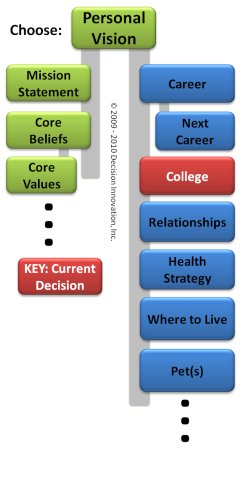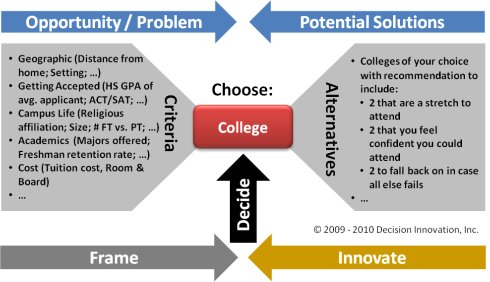Pick a college for a successful start to your career
 Is it time for you to pick a college? Now is the time to look at all the factors that could influence which college you will attend. Research has shown that you are more likely to be a successful college student if you are happy living in the environment found on a particular campus in a particular community. If your environment at school is one where you find yourself unhappy or uncomfortable, it may be difficult to stay committed academically. You can increase the likelihood of success and happiness by making a well-informed, carefully thought-out decision.
Is it time for you to pick a college? Now is the time to look at all the factors that could influence which college you will attend. Research has shown that you are more likely to be a successful college student if you are happy living in the environment found on a particular campus in a particular community. If your environment at school is one where you find yourself unhappy or uncomfortable, it may be difficult to stay committed academically. You can increase the likelihood of success and happiness by making a well-informed, carefully thought-out decision.
If you are a young adult, this will be a new stage in your life. Your years of secondary school will soon be part of your past. Your future will include an occupation or continuing education, may be near or far from home, and may be filled with uncertainty. Using our personal decision making process to pick a college can help increase confidence, excitement, and optimism when making this important life choice.
Where should you start in picking a college?
 There are many factors to consider when you are ready to pick a college. You will want to:
There are many factors to consider when you are ready to pick a college. You will want to:
- Identify which criteria to consider
- Figure out which factors are of highest priority for you
- Determine which factors you are able to compromise on or eliminate
As a future college student, this decision is largely yours to make. If you are a young adult, we suggest that you seek the counsel of your parents, school guidance counselors, and other individuals who have walked through this process in the past and can guide you along the way. Be prepared to communicate with anyone who may be supporting you financially as you pursue your education.
If this is your first time helping your son or daughter pick a college, seek out the input of other parents who have already successfully helped their children. Talk to parents who have children attending colleges your child is considering. Their perspectives can help in refining and evaluating your selection criteria.
It is essential that every person deciding on a college education be realistic. Every school that you would like to attend may not accept you academically, or may exceed your financial resources. College planning advisors/high school guidance counselors might encourage you to apply to six colleges: two that are a real stretch for you to attend, two that you feel relatively confident you could attend, and two to fall back on in case everything else fails.
Factors to consider when selecting a college
It is easy to "fall in love" with a specific campus and "want to go there" for all the wrong reasons. Careful selection consideration before you visit campuses can prevent you from picking a college you will regret after you arrive on campus. Here are some helpful criteria grouped into five major categories (geographic, getting accepted, campus life, academics, and cost):
Geographic
- Distance from Home / Region of the country or world - Do you hope to return home on weekends to see your family, friends, or a boyfriend/girlfriend? Do you want to move far away from home and stretch yourself to be fully independent? Look at a map, and identify the range of locations you are willing to live in for the next four (or more) years of your life. Consider the ease or difficulty of travelling between home and school for holidays, summers, and school breaks. Are there multiple options for travel home (car, train, bus, plane, ...)?
- Setting - Do you like corn fields, nature, and quiet? Do you like the hustle and bustle of life in the big city? Or perhaps something in between? What about the climate? Can you handle snowy winters, hurricanes, tornadoes, and/or earthquakes? What about the safety issues of different communities?
- Percentage of Students from In-State vs. Out-of-State vs. International - Will you have something in common with your college friends? Will you have someone to travel home with for a weekend? Would you enjoy meeting people from all over the country or world? This information is typically available via the college or university website.
Pick a college where you will be accepted and succeed

- High School GPA of Average Applicant - To be successful and thrive, your high school GPA should be within the range of those students who will be your college peers. Be aware that various high schools use different percentages to determine their letter grades. If possible, provide the colleges with your percentage grades from high school classes taken, not just your GPA, to ensure that the college has the best information for comparison to your peers (e.g., At some high schools 90% is a B, while at others 90% is an A). While providing this information may or may not facilitate acceptance, it provides more accurate information.
- ACT/SAT Scores of Average Applicant - ACT/SAT scores can provide a nationalized standard to help establish that students will be your academic peers, avoiding differences in GPA standards. Be aware that taking repeated ACT/SAT preparation classes can artificially help you raise your score, potentially allowing you to pick a college inconsistent with your academic ability.
- High School Rank of Average Applicant - Does the college require you to be of a particular rank among your fellow high school students?
Campus life
- Religious Affiliation - Do you want to attend a college affiliated with a particular religion, or would you like to pick a college that has numerous religions represented?
- Size - What size of school would you feel comfortable attending? Would you like a smaller campus where you meet people you know as you walk ten minutes to class? Would you like life on a larger campus with possibly longer distances to class, but larger sports/entertainment/professional connections as a graduate? Or something in between?
- Number of Fulltime Students vs. Number of Part Time Students - Do you want to be surrounded by fulltime students following a four year plan to get their degree? Do you want to be surrounded by students who are working jobs while they are taking part time classes?

- Percentage of Students who Live on Campus - Would it bother you if your college friends live at home instead of on campus? Would it bother you if your on-campus friends go home every weekend ("Suitcase College")?
- Fraternity and Sorority Presence on Campus - Is it a goal of yours to join a fraternity or sorority? Is it a goal of yours to avoid the presence of sororities and fraternities? If Greek life is a strong presence on the campus, are there other social options for those who don't participate? Will you sit in your dorm room feeling excluded if your friends spend their social time with a fraternity or sorority?
- Percentage of Males vs. Females on Campus - Do you anticipate the fun of meeting new friends, male and female? Would you prefer to pick a college to focus more on academics without the dating factor?
- College Varsity/Intramural Sports - Is the camaraderie of large visible sports teams important to you? Are you looking to play seriously at the college level or just for fun? Are you just interested in watching a college team with other students?
Academics
- Majors Offered - A school you want to attend must offer the Major you are interested in pursuing. If you are unsure of your major, do you want to pick a college that offers a large variety of majors so you can change within that university, or would you consider transferring to another university if you change your mind about what you want to pursue?
- Freshman Retention Rate - Research how many freshman students return to the school the following year. You want to attend a school where freshmen are helped to be successful. Does a particular school say to its freshman class "Look around - Half of you won't be here next year"? Or does the school say "Our hope is that each of you will successfully complete your degree, and we offer tutoring, study groups, and advisors with office hours to help you"?
- Graduation Rate - What percentage of each freshman class graduates four (or five) years later? Pick a college that provides the greatest opportunity for success.

- Percentage of Classes with Less than Twenty Students - Are you the type of student who needs to be able to ask questions, discuss, and be held accountable for being present in the classroom?
- Percentage of Classes with more than Fifty Students - Are you the type of student who is just fine in a lecture hall filled with a few hundred students getting help from Teaching Assistants during separate discussion sessions? Do you have the self-discipline to go to class even if the professor doesn't know you're there?
- Percentage of Students at College who are in your Major - Is the major you want to pursue a financial and academic priority at the university? Does it have a strong presence? Will the professional community respect the education you get in that major at that university? Do major companies hire students from that college for your chosen major?
- Job placement success and assistance - What does the college offer in career services? Do they help arrange for on-campus job fairs and interviews? What percentages of their graduates have found work with a company or organization within their major, one year after graduation? Pick a college that will help in the next step of your career development.
Pick a college you can afford

- Tuition Cost - What is the cost to attend this school? How much financial aid are you likely to get at this particular school? Private colleges typically have higher tuition, but academic and sport scholarships are more plentiful and generous. Don't make assumptions that out-of-state is more expensive than in-state. Look at each school individually when deciding on a college.
- Room and Board Cost - What housing options are you interested in? Double? Single? Residence hall? Apartment? Suite with kitchen? Air conditioning? Cleaning service? Consider the various meal plans available to you. Something to consider: Most students don't eat 21 meals a week in the Dining Halls.
So are you ready to pick a college?
According to National Center for Education Statistics, Digest of Education Statistics, there are over 4100 college and universities to choose from in the United States alone (including 2 & 4 year schools, public & private). Here is an approach that you can use to efficiently and effectively reduce the set of possibilities when deciding on a college. To initially pare down the list, you can decide amongst factors which you are not willing to compromise. These could include some of the items from our larger list such as:
- Type of degree (2yr Associates vs. 4 yr Bachelors or advanced degrees)
- Distance from home / Region of the country or world
- Setting (Urban, Suburban, or Rural)
- Religious affiliation
- Size of school (less than 2,000, 2,000 - 15,000, 15,000+)
- Public vs. Private
- Varsity sports
- College major
- Tuition & fees
- Room & board availability
In reviewing these factors, we hope that we have opened you up to many possibilities that you may not have realized were available. You may recognize that you simply are not ready to make this decision, and it is best for you to work for a while and get to know yourself better first. You may realize that you have so much uncertainty about which direction you want to go that it is best to take general education courses at your local community college for a year or two while you expose yourself to different possible career directions. You may realize that you want to head out the door to a university with an undeclared major.

One way to consider career options is to look at the college courses required to complete a major you're interested in pursuing. If the classes catch your interest and you look at them with excitement, you might have found your niche. If you look at four years of classes that will bore and frustrate you, you might want to seek a different direction. Or you may be a student who has known for a long time what you want to pursue in a career.
Where can I get the information to compare and pick a college?
Here are some resources you can use to get information about the factors listed above for the colleges you are interested in:
- US News & World Report - College Guide
- College Board - College Matchmaker
- College Navigator - sponsored by the National Center for Education Statistics
It is your decision!
Whatever your decision at this point, if you use a thoughtful process to pick a college, it will be right for you. Do not shape yourself into a mold that is made for someone else. Each person has been given unique gifts and talents. The decisions you make now will affect how you will spend much of your time for the rest of your life. We encourage you to take control, pursue your dreams, and move forward in a direction that will allow you to lead a fulfilling and rewarding life.

